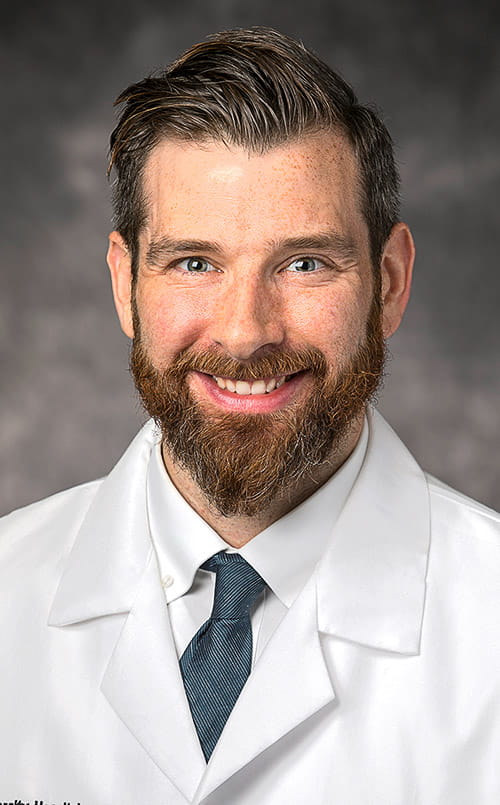Using ECMO for Refractory Cardiac Arrest
November 10, 2021
New ECPR Program at University Hospitals Cleveland Medical Center is only one in Northeast Ohio
Innovations in Cardiovascular Medicine & Surgery | Fall 2021
 Colin McCloskey, MD
Colin McCloskey, MD Yasir, Abu-Omar, MD
Yasir, Abu-Omar, MDThe high-volume, growing extracorporeal membrane oxygenation (ECMO) program at University Hospitals Cleveland Medical Center is on pace to have its busiest year ever, surpassing 100 runs. However, now it has added a rare but crucial aspect – an extracorporeal cardiopulmonary resuscitation (ECPR) program for managing patients with refractory out-of-hospital cardiac arrest. The ECPR program at University Hospitals Cleveland Medical Center is currently the only one in Northeast Ohio.
The new program falls under the umbrella of the Hambrick Center for Cardiac Recovery, of University Hospitals Harrington Heart & Vascular Institute, The Center was established in 2019 with a $5 million gift from Angela and James Hambrick. It was also made possible because of advancements in the evidence supporting the use of ECMO in cardiac arrest patients with refractory ventricular fibrillation or ventricular tachycardia.
“The recent ARREST study, a randomized controlled trial, showed a pretty impressive benefit,” says intensivist and emergency medicine physician Colin McCloskey, MD, Co-Medical Director of the ECMO Service at University Hospitals. “That has certainly been catalyzing a lot of academic centers like ours who already have this capability to coordinate with all of team members across different treatment domains to make this happen in a systematic way.”
For the ARREST trial, conducted at the University of Minnesota, researchers compared outcomes for 30 patients with out-of-hospital cardiac arrest, refractory ventricular fibrillation, no return of spontaneous circulation after three shocks, automated cardiopulmonary resuscitation with a Lund University Cardiac Arrest System, and estimated transfer time shorter than 30 minutes. Half were randomly assigned to typical advanced cardiac life support measures; the other half received ECMO-facilitated resuscitation. Survival to hospital discharge was observed in one patient in the standard ACLS treatment group versus six in the early ECMO-facilitated resuscitation group
“The difference demonstrated, in fact, was so vast that it actually prompted early cessation of the trial,” says Yasir Abu-Omar, MD, Director of Cardiothoracic Transplantation and Mechanical Circulatory Support at University Hospitals Harrington Heart & Vascular Institute, and one of the leaders of the new ECPR program. “The evidence was overwhelming.”
The desire to improve outcomes for relatively young cardiac arrest patients was also an important motivation behind establishing the new ECPR program at University Hospitals Cleveland Medical Center, Dr. McCloskey says.
“According to registry data, around 10 percent of people who have these rhythms and get medical therapy will survive with a good neurological outcome, which is being able to walk out of the hospital and go back to work,” he says. “However, this registry data probably over-estimates good outcomes, so it’s probably less than that. In our experience, it’s less than that, which is why any effort like this that tries to improve that number is meaningful.”
At University Hospitals Cleveland Medical Center, the new ECPR program is limited to adults age 18 to 65 who have certain favorable cardiac arrest characteristics. There has to be a witness to their cardiac arrest who has started CPR, and their initial rhythm as measured by the EMS team needs to be shockable.
“Refractory VF and VT are one of those favorable cardiac arrest characteristics,” Dr. McCloskey says. “It was in that population that the randomized controlled trial really showed the positive effects of having a system like this. So right now, we are only offering this support for that population.”
As the new ECPR program at University Hospitals Cleveland Medical Center gets off the ground, both Dr. McCloskey and Dr. Abu-Omar say they’re heartened by the hard work and collaboration across disciplines at UH that have made the program possible to launch.
“It takes a lot of coordination, a lot of collaboration, a lot of effort to get everyone from the pre-hospital environment, to the ED, to our cardiac surgery colleagues, to the ICU, to get this all done,” Dr. McCloskey says.
“You cannot just do ECPR on the go – there needs to be a system in place capable of doing this,” Dr. Abu-Omar adds. “You need to have certain institutional and personnel commitment to be able to deliver that. You also need protocols and education to all members of the team that are involved. It’s not necessarily a straightforward process. It took Colin and I many months of work coordinating all the teams and the stakeholders who would be implementing this and involved in the application of this.”
However, both physicians are satisfied with University Hospitals’ status as an early adopter of ECPR for these difficult-to-treat cardiac arrest patients.
“A lot of systems are not quite at the early adoption of this support for cardiac arrest,” Dr. McCloskey says. “I think as we improve our program, as we report our outcomes, as other places adopt this, we are going to see an uptick in this particular program type across the nation.
Dr. Abu-Omar, who is also the Co-Director of the Hambrick Center for Cardiac Recovery, would like to extend gratitude to Mr. and Mrs. Hambrick, for their generosity, allowing us to achieve this at University Hospitals.
Contributing Experts:
Colin McCloskey, MD
Co-Medical Director of the ECMO Service
University Hospitals
Assistant Professor of Emergency Medicine and Anesthesia Critical Care
Case Western Reserve University School of Medicine
Yasir Abu-Omar, MD
Director of Cardiothoracic Transplantation and Mechanical Circulatory Support
University Hospitals Harrington Heart & Vascular Institute
Clinical Professor of Surgery
Case Western Reserve University School of Medicine


